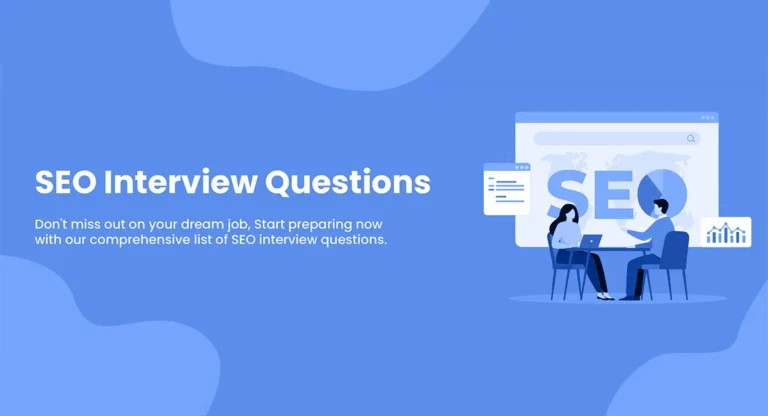Securing a job interview for a Search Engine Optimization (SEO) Specialist position is a significant achievement in itself, but the real test lies in the interview. SEO is a dynamic field, requiring both technical expertise and an understanding of ever-evolving algorithms. Employers are looking for candidates who not only have the knowledge but also the ability to apply it effectively to real-world situations. This is where thorough preparation becomes crucial. Becoming familiar with common SEO interview questions and answers will help you feel confident and prepared for any challenge
Table of Contents

The interview process for an SEO Specialist can vary widely depending on the company and the specific role you’re applying for. Some companies may conduct a single interview with the hiring manager, while others might organize multiple rounds involving different members of the team. Regardless of the format, the goal remains the same: to determine if you are the right fit for the job and the company.
Employers will test your understanding of SEO concepts, your ability to implement them, and your compatibility with the company’s culture. Search engine optimization interview questions often cover a broad range of topics, from basic principles to advanced strategies. This includes technical questions, situational questions, and even personal questions to gauge your passion for the field. Working with an SEO Company can provide valuable insights into these processes, as they often have specialized roles and diverse requirements for their SEO teams

As an SEO Specialist, your expertise will be put to the test through various skills-based questions. These questions aim to assess your knowledge of key SEO concepts, such as keyword research, link building, and on-page vs. off-page SEO. For instance, you might be asked:
Question: How do you measure SEO success?
Answer: This is an opportunity to showcase not only your technical SEO skills but also your understanding of business objectives. A comprehensive answer would include discussing various key performance indicators (KPIs) such as organic traffic, conversion rates, and backlink quality. You might also mention tools like Google Analytics and Ahrefs that help track these metrics effectively.
Question: Which SEO factors are not in your control?
Answer: While SEO specialists have control over many aspects of optimization, certain factors remain beyond their influence. For example, Google’s ever-changing algorithms are a significant factor that SEO professionals must adapt to, rather than control. Similarly, the age of a domain is another element that affects search engine rankings but is not something you can alter. Understanding these limitations is crucial, but what’s more important is demonstrating how you can work around them to achieve your SEO goals.
Technical questions in an SEO interview focus on your ability to handle the more complex aspects of search engine optimization. These could include questions about specific tools, coding practices, or strategies for optimizing large-scale websites. For instance:
Did you know that Google changes its search algorithm around 500 to 600 times each year? This means that, on average, Google is updating its search algorithm more than once per day! Staying up-to-date with these changes is crucial for any SEO specialist, as even minor updates can have a significant impact on search engine rankings. This fact underscores the importance of continuous learning and adaptation in the field of SEO.

Beyond technical and skills-based questions, employers are interested in your personal journey in SEO. They want to understand what drives you, how you stay current in the industry, and how you handle challenges. Common personal questions might include:
Question: How did you learn SEO?
Answer: Every SEO professional has a unique story. You might have started with a formal education in digital marketing or discovered your passion through exploring the Difference Between Blogs and Vlogs as part of your content creation strategy. What’s important is to emphasize your commitment to continuous learning. Mention any online courses, webinars, or industry blogs you follow to stay updated on the latest SEO trends and best practices.
Question: How do you see SEO changing in the near future?
Answer: SEO is constantly evolving, and it’s essential to stay ahead of the curve. With the rise of AI-driven search algorithms and voice search, the future of SEO will likely focus more on user intent and delivering high-quality, relevant content. Understanding these trends and being able to anticipate changes will make you a valuable asset to any team.
Situational questions are designed to assess how you would handle specific challenges on the job. These questions test your problem-solving skills, communication abilities, and leadership potential. For example:
Question: How would you go about simplifying a complex issue in order to explain it to a client or colleague?
Answer: Effective communication is key in SEO, especially when working with clients or team members who may not have a deep understanding of the field. Start by breaking down the issue into simpler terms, using analogies or visual aids if necessary. For instance, you might compare the structure of a website to a building, with the foundation (technical SEO), walls (content), and roof (off-page SEO) all working together to create a strong, stable structure. This approach makes it easier for non-technical stakeholders to grasp the importance of each element and how they contribute to overall SEO success.
Behavioral questions delve into your past experiences to predict how you might perform in future situations. These questions often focus on challenges you’ve faced and how you’ve overcome them. For instance:
Question: Tell me about your biggest SEO screw-up. What were the results, and what did you do about it?
Answer: Everyone makes mistakes, but how you handle them is what truly matters. When answering this question, be honest about the mistake you made, whether it was targeting the wrong keywords or implementing a flawed strategy. Then, focus on how you identified the problem, took corrective action, and learned from the experience. This demonstrates not only your problem-solving skills but also your ability to grow and improve as an SEO specialist.

For those applying to top tech companies or senior SEO positions, the interview may include more advanced questions. These questions often require a deeper understanding of SEO principles and the ability to think critically under pressure. Examples include:
Question: What are your three biggest weaknesses, and how did you turn them into advantages in your most recent position?
Answer: This question requires a high level of self-awareness and strategic thinking. Start by identifying areas where you may have struggled, such as time management or adapting to new tools. Then, explain how you recognized these weaknesses and took steps to improve. For instance, if you struggled with time management, you might have started using project management tools to better organize your tasks and prioritize your workload. By turning weaknesses into strengths, you demonstrate resilience and a commitment to personal and professional growth.
Preparing for an SEO Specialist interview requires a thorough understanding of both technical and non-technical aspects of the job. By familiarizing yourself with search engine optimization interview questions and search engine optimization interview questions and answers, you can approach your interview with confidence. Remember, the key to success lies in your ability to not only showcase your knowledge but also demonstrate how you can apply it to help the company achieve its goals. As SEO continues to evolve, staying ahead of the latest trends and best practices will ensure that you remain a valuable asset in this ever-changing field.
Nirbhay Chauhan is a Performance Marketing and ROI Specialist with expertise in SEO, PPC, and media planning. With a passion for data-driven strategies, Nirbhay helps businesses scale by optimizing their marketing efforts to deliver measurable results. His extensive experience in driving online growth and maximizing ROI makes him a trusted partner for businesses looking to elevate their digital presence.